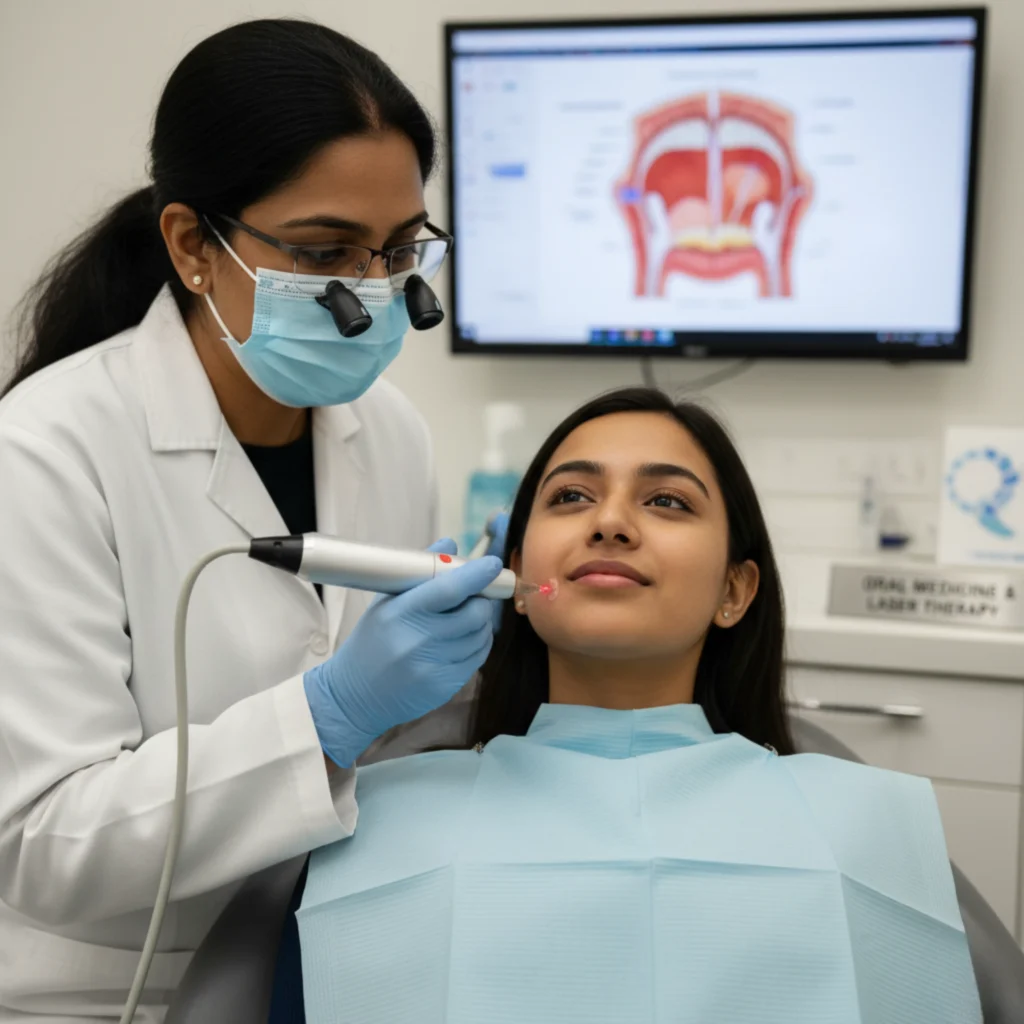Oral mucosal lesion treatment is essential for maintaining overall oral health and preventing complications. Oral mucosal lesions are abnormal changes in the lining of the mouth, which can range from mild irritation to potentially serious conditions. Early detection and proper treatment play a crucial role in preventing progression and ensuring effective healing. Patients should prioritize professional evaluation to accurately diagnose the type of lesion and receive appropriate care.
Oral mucosal lesions can appear as white, red, or mixed patches, ulcers, or nodules in the mouth. They often occur due to infections, trauma, systemic conditions, or lifestyle habits such as tobacco use. Identifying the underlying cause is the first step in oral mucosal lesion treatment. In some cases, lesions may be harmless and self-limiting, while in others, they could indicate precancerous or cancerous changes. Therefore, consulting a dental specialist is crucial for accurate diagnosis and management.

Understanding the type of lesion helps determine the right oral mucosal lesion treatment plan. Dentists usually combine clinical evaluation with biopsy or other diagnostic tests for precise assessment.
Accurate diagnosis is the cornerstone of effective oral mucosal lesion treatment. Dentists begin with a thorough oral examination, medical history review, and sometimes imaging or laboratory tests. Biopsy procedures are commonly used to confirm the nature of persistent or suspicious lesions. Early diagnosis not only allows for timely treatment but also reduces the risk of serious complications, including oral cancer.
Patients are encouraged to report any persistent oral changes, such as unexplained ulcers, white or red patches, or chronic irritation, to their dental professional. Transitioning to prompt evaluation ensures better outcomes and promotes long-term oral health.
Several factors can increase the likelihood of developing oral mucosal lesions:
Identifying these risk factors is an essential part of oral mucosal lesion treatment, as managing the underlying cause improves the effectiveness of therapy and reduces recurrence.
The approach to oral mucosal lesion treatment varies depending on the lesion’s type, severity, and underlying cause. Common treatment methods include:
1. Medical Management
Topical or systemic medications are often prescribed to manage inflammation, infection, or pain. Corticosteroids, antifungal agents, or antiviral medications may be recommended based on the diagnosis.
2. Surgical Intervention
For lesions that are precancerous or do not respond to conservative treatment, surgical removal may be necessary. Techniques like laser excision, cryotherapy, or conventional surgery are used to remove abnormal tissue while preserving healthy areas.
3. Lifestyle and Preventive Measures
Patients are advised to adopt good oral hygiene practices, avoid irritants such as tobacco and alcohol, and maintain a balanced diet rich in vitamins and minerals. These measures complement professional treatment and reduce the risk of lesion recurrence.
Transition words such as “therefore,” “additionally,” and “consequently” are often applied to guide patients through the treatment process, ensuring clarity and understanding.
Modern dental practices offer advanced diagnostic tools and minimally invasive treatment options for oral mucosal lesion treatment. Digital imaging, laser therapy, and precision-guided surgical techniques ensure safer and faster recovery. These technologies allow dentists to target affected areas accurately, minimize discomfort, and reduce healing time.
Additionally, patient education on early warning signs and self-monitoring contributes to effective lesion management. Combining professional care with informed self-care promotes long-term oral health and prevents recurrence.
Successful oral mucosal lesion treatment does not end with the procedure. Post-treatment care includes proper oral hygiene, dietary modifications, and regular follow-ups with the dental specialist. Monitoring the treated area ensures early detection of any recurrence or new lesions.
Patients should also report any persistent pain, bleeding, or unusual changes immediately. Ongoing communication with the dentist enhances recovery outcomes and ensures sustained oral health.
Effective oral mucosal lesion treatment requires early detection, accurate diagnosis, and comprehensive care. By combining professional treatment with preventive home practices, patients can achieve faster healing, reduce recurrence, and maintain optimal oral health. Regular dental check-ups and timely consultations with specialists play a critical role in preventing complications. For those seeking specialized care, choosing the right facility is essential. If you are looking for the best dental clinic in Miyapur, professional guidance ensures timely and effective management of oral mucosal lesions.
For expert consultation and personalized treatment, visit Unidental, where advanced technology and patient-centered care provide the best solutions for all oral health concerns. Your oral health deserves the best attention, and Unidental ensures every patient receives personalized care for lasting results.
Oral mucosal lesions can be caused by trauma, infections, systemic diseases, tobacco use, or precancerous conditions.
Some lesions are harmless, while others may be precancerous or cancerous. Early evaluation is key to determining the risk.
Treatment depends on the type, size, and underlying cause of the lesion. Dentists may use medications, surgical removal, or lifestyle modifications.
Yes, especially if the underlying cause is not addressed. Regular dental check-ups and preventive care minimize recurrence.
Healing time varies depending on the treatment method and lesion type, ranging from a few days for minor ulcers to several weeks for surgical procedures.
Hyderabad : +91 6305 971445
Anantapur: +91 70758 90089
Goa: +91 83266 32500
Mon to Sat 10:00AM to 8:00PM
Sun 10:00AM to 12:00PM

Our goal is to provide friendly, caring dentistry with the highest standards in general, cosmetic, and specialist treatments. We strive to be the best dental hospital for comprehensive oral care.
We use advanced dental technology to deliver safe, precise, and painless treatments for every patient.